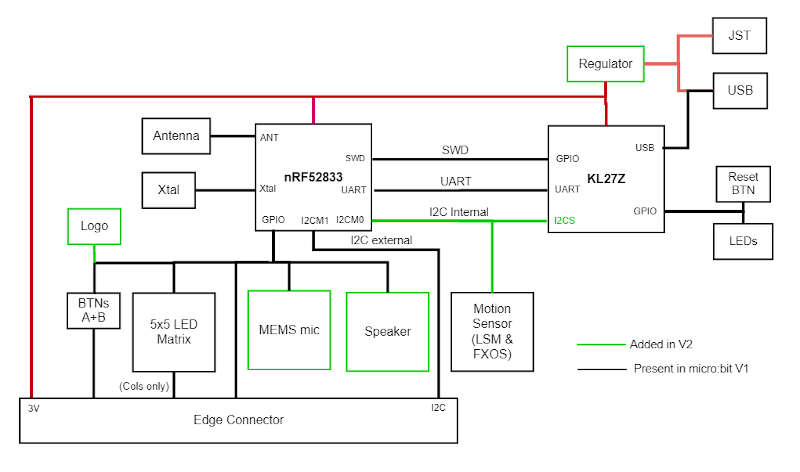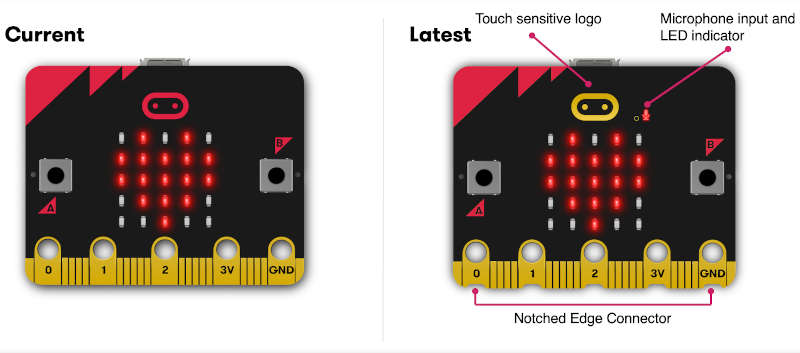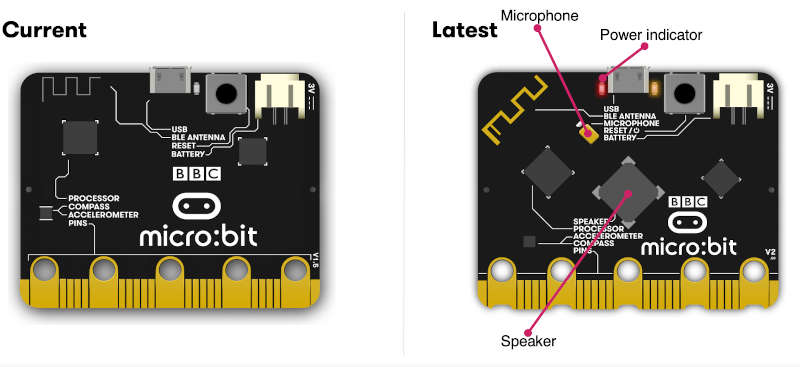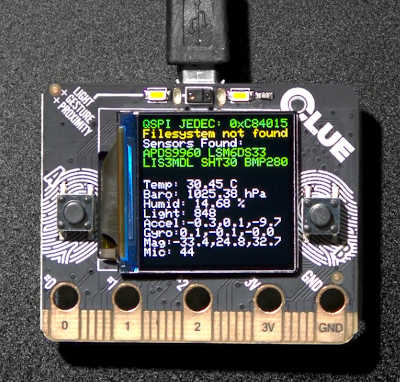| New BBC micro:bit |
| Written by Harry Fairhead |
| Wednesday, 14 October 2020 |
|
The BBC micro:bit has an upgrade and it's an interesting one. Can this give it a new lease of life in terms of a wider adoption beyond education? The micro:bit was, and still is, an essentially educational project. Back in 2015/2016 800,000 devices were handed out free of charge to UK Year 7 (11/12 year-old) school children. The BBC was heavily involved in the project in some sort of attempt to repeat its sucess with the original BBC Micro. Why the BBC had the need to get involved is a mystery as it was something not really in their core mandate, but this is old history. After a short while, the BBC handed over control to a separate entity, the micro:bit Educational Foundataion and things started to cool off publicity-wise. The micro:bit has been something of a niche device in that it is suited mainly, but not exclusively, to the educational market. It is easy to get started with and in theory has a big "upper limit". "We’ve always aimed for a “low floor and a high ceiling”: it must be super easy to get started, and you shouldn’t hit any barriers as your projects get more complex and grow beyond the device itself." The only problem with this lofty sentiment is that the ceiling was lower than you might expect. Running out of memory and runing out of processing power was a constant problem for any micro:bit programmer. The fact of the matter is that the micro:bit was good for simple LED flashing and button pushing but, with notable exceptions, wasn't really up to doing anything real. When put against the similarly-positioned and priced Raspberry Pi Zero, it just didn't compete. On the other hand, it didn't have the problems of having to deal with Linux and a much steeper getting started curve. It is worth noting that a recent paper claimed that five million devices are in use and 25 million teachers and students use it worldwide. This has to be compared to more than 30 million Pi devices and an unknown number of educational users. The latest announcment is that there is a new BBC micro:bit and it is more powerful. It has an upgraded processor, the Nordic Semiconductor nRF52833 64MHz Cortex, and now has 32KBytes of RAM, up from 16KBytes, which is an improvement, but still not a huge amount.
The new features are:
You can compare the old and new in the following photos:
There is still no WiFi, just BLE which is useful but limits the sorts of things you can do. However, access to the raw radio protocols make it suitable for experimentation. The display is still just a set of LEDs, which again is limiting and requires some imagination to get anything special out of it. Compare this to the Adafruit CLUE, which is a micro:bit with a TFT display:
Although this is $40 it could be less with economies of scale. Perhaps something like the Clue will be version 3? Coming to a final verdict isn't easy. Anything the first version can don this will do better. At the moment it isn't completely supported by all of the programming environments, but the omissions are small and mostly irrelevant. There is a new hex file format which supports both versions of the device so that there is no need to worry which device the student has. The micro:bit is a fun device with lots of built-in sensors and an easy way to get started. It still suffers from being underpowered for any real application and, outside of education, I don't think it is a threat to the Pi or the Arduino, but this isn't its role in life anyway. I'm looking forward to playing with one, but I doubt I would use it for something "real" even as a proof of concept.
More InformationIntroducing the latest BBC micro:bit Related ArticlesThe BBC Micro:bit Which Language? Commando Jump Game For The Micro:bit In Python Commando Jump Game For The Micro:bit In JavaScript Micro:bit Commando Jump In The Microsoft Block Editor Commando Jump Game For The Micro:bit In Touch Develop The BBC Micro:bit Is An Mbed Device In C/C++ Getting Started With C/C++ On The Micro:bit Offline C/C++ Development With The Micro:bit BBC Micro:Bit Finally Ships to 1 Million For Free BBC micro:bit Your Next Computer? BBC Giving Away 1 Million Microcomputers Microsoft Open Sources TouchDevelop
To be informed about new articles on I Programmer, sign up for our weekly newsletter, subscribe to the RSS feed and follow us on Twitter, Facebook or Linkedin.
Comments
or email your comment to: comments@i-programmer.info |
| Last Updated ( Wednesday, 15 December 2021 ) |






